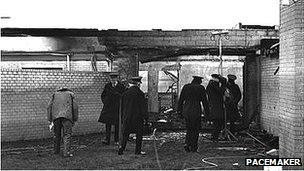La Mon IRA bomb victims want public inquiry after HET report
- Published
Families of some of those killed by an IRA bomb 30 years ago have demanded a full public inquiry into the atrocity.
Twelve members of the Irish Collie Club were killed at La Mon Hotel, on the outskirts of east Belfast on 17 February 1978.
An Historical Enquiries Team (HET) investigation into the IRA bombing has revealed that crucial police documents have been lost.
Relatives have said the HET report "lacks integrity and morality".
The families, who are represented by an organisation that calls itself Ulster Human Rights Watch, said that original transcripts with IRA members who were interviewed about the bombing are missing.
In a statement on Thursday, they claimed: "It would appear to the victims that key documents were removed from the files with the view to protecting IRA members who today may be involved in the peace process at the highest level.
"This case, in common with other major investigations, appears to show that the will to uncover the truth has been curtailed for fear of destabilising the current political process."
In response the HET said their review into the La Mon murders extended over several years and they sought to trace and review all documentation and to recover any exhibits that were available.
"Sadly, as is frequently the case in reviews of historical investigations dating back in some cases many decades, some of the original documentation and exhibits are missing," they added.
"The HET review on La Mon provides as full an account as possible about what happened and how the investigation was conducted and has tried to address specific individual questions put by families."
'More questions than answers'
However, Billy McDowell, who was injured in the bombing, said the HET report raised more questions than answers.
"We met with the HET on at least five occasions during the past two years and each time we were hoping for some good news," he said.
"But in receiving the final report we were disappointed to find there is very little information that we didn't already know about before they even started and a lot of questions are left unanswered."
Jim Mills, whose wife and sister-in-law were murdered, said: "It was just a farce. A waste of two years. Building ourselves up - and we're not able to cope with all this pressure - and you go after two years, and absolutely nothing.
"We would like to find out who did it. We weren't asking for an awful lot.
"They more or less know who did it, but they're not allowed to tell because they haven't been prosecuted."
The 12 people killed at La Mon, all Protestants, included three married couples. Twenty-three people were also seriously injured in what witnesses described as a huge fireball.
During the Royal Ulster Constabulary (RUC) investigation into the bombing, 35 people, mostly members of the Provisional IRA, were arrested for questioning.
Mass murder

Thirty five people, mostly members of the Provisional IRA, were arrested for questioning during the investigation
West Belfast man Robert Murphy was sentenced to life imprisonment for manslaughter in 1981. He was released in 1995 and died in 2006. A second man was acquitted.
The families of those killed recently received a 81-page report from the HET on the RUC investigation into the bombing.
The HET is responsible for re-examining all deaths attributable to the Troubles between 1968 and 1998.
On the 34th anniversary of the atrocity, the families involved have called on the Secretary of the State, Owen Paterson, to establish a public enquiry.
"It is most disturbing that the investigation of an attack, described by the RUC as horrific and indiscriminate mass murder has been hampered because key documentation has been mislaid," they said.
Their statement added: "Considering the circumstances of this horrendous crime and the certainty of the involvement of the IRA, the victims are appalled by the absence of diligence shown by the RUC/PSNI in ensuring the preservation of all information related to this investigation and also calls into question the integrity and thoroughness of the whole historical enquiry process."
In a letter to one of the families, David Cox, the director of the HET, said: "Despite enquiries carried out by the HET and additional forensic analysis on available exhibits, the review did not uncover any evidential opportunities.
"Therefore, the investigation has not been referred to the PSNI and the review summary report has been delivered to those families who have engaged with the HET process."
Mr Cox, also said that the HET "cannot name people who have never been charged with or convicted of an offence connected to the bombing at La Mon, or whose name is not legitimately in the public domain".
- Published16 February 2012